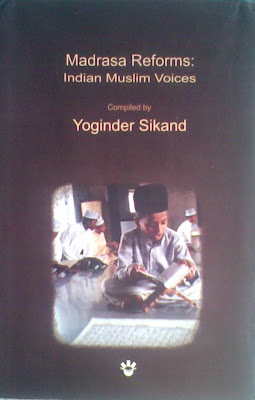Book Review
Book: Madrasa Reforms: Indian Muslim Voices
Author: Yoginder Sikand
Year of Publication: August 2008
Publisher: Vikas Adhyayan Kendra(VAK),Mumbai
Price=Rs.100
Reviewed by Mushtaq ul Haq Ahmad Sikander
“Madrasa.” When someone utters this name, no sooner does he complete his sentence than our mind rings with Fundamentalism, dens of Terror, fanticism, extremism, rigid and all sorts of pre-conceived notions begin engulfing our judgement. The madrasas for centuries have been luminaries of faith, knowledge and practice embedded into one. These madrasas have kept the candle of divine knowledge (Ilm) burning even in adverse times. Though the madrasa has played a pivotal role in providing leadership and scholars to the Muslim Society especially in the South Asia, but the fact must also be acknowledged that in due course of time there has been degradation to the role of Madrasa in Society.

After 9/11 the debate about the madrasas took the centre stage and still continues so. The Empire controlled media painted all the madrasas with the same black brush to culminate The War On Terror. There was no serious attempt to understand the structure, administration, pupils, teachers, fund raising and future of madrasa by any collective government study or individual attempt, so the smokescreen about madrasaa continued to dominate the elite intellectual class as well as common masses.
The present book under review by austere contemporary scholar-activist Yoginder Sikand is an exception. This book contains interviews with luminaries, scholars-administrators as well as students of the madrasa. These belong to a wide cross-section of society including Shias as well as Sunnis and among them scholars & students associated with Deobandi, Nadwi, Barelvi, Ahle-Hadith and Jamaat-e-Islami school of thought. These interviews also include scholars, journalists and activists like Asghar Ali Engineer, Zafarul Islam Khan, Maqbool Ahmad Siraj and Professor Akhtarul Wasey, who themselves though not a product of madrasa education but are closely linked to Muslim related issues, taking up the Muslim cause and making unaddressed voices of Muslims heard through writing and activism.
As Asghar Ali Engineer rightly predicts in the Preface of the book that it will “Help dispel many myths about madrasa education in India”. This book truly lives upto this remark as all the interviwees agree that there shoud be reform in the madrasa educational system, so that the artificial gulf created by the branding knowledge as “Secular” and “Religious” will be eradicated. Another crying need of the hour is that madrasa graduates who are churned out in scores every year must not have a limited job opportunity as they are good for nothing other than preachers, Imams or madrasa administrators. So this madrasa learning must not end in a viscous circle in itself, but the madrasa graduates must interact with a varied cross section of society.
The biased blinding views about the madrasas being breeding grounds of Terrorists is a myth and fear inculcated by media at the pretext of Politicians with vested interests. There has been no evidence to prove this allegation against madrasas in India. The madrasa graduates wish and work to build a just society on the priciples of peace and justice as they are taught and enshrined to uphold these pluralistic and harmonious priciples in their seminaries. Though there maybe some loopholes in the madrasa system because of some traditional voices who don’t wish to compromise their rigid stand or are afraid of the degradation or even usurption of their status by the sweeping reform, but inspite of these discouraging features the last five interviews with madrasa graduates who now are studying in various leading universities like Jamia Milia and Jawaharlal Nehru University provide a ray of hope for the bright future and enthralling reforms in the “Madrasa Education” which account for the free education of millions of Muslims nationwide plus free boarding and lodging facilities for which the money comes from the Muslim Masses.
The book is a commendable job done by the author, as it caters to the present burning issue of Madrasas. Though much have been written by the scholars of madrasas about these seminaries but unfortunately bulk of these works is in urdu which has been reduced to a minority status. This work in English is an unbiased account from an objective scholar’s pen which will be of equal interest and help to scholars, activists, students and all those interseted in understanding the mind of those who are championing and representing the cause of Islam and Muslims. The book is worth reading and it needs to be translated into Urdu and sent to every madrasa and ashram in the hope that it would remove the barriers of hate, prejudice, anarchy and communalism among the communities to let them live with common brotherhood, love and peace.

